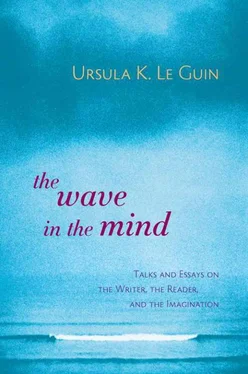The stresses are indicated by bold type.
The pauses or subdivisions I call bars are indicated by a vertical slash. A slash means a minimal pause or change of voice quality, a double slash indicates a longer pause. Longer pauses mostly coincide with punctuation, and indeed punctuation is almost always a guide to phrase grouping. In marking these bars, again my decisions were made reading aloud, not silently.
In the Stein passage, punctuation is an urgent necessity; without it the words would fall into a mumble-jumble in which the reader would be hopelessly lost. I had no hesitation in marking the Woolf passage, which to my ear fell inevitably into its brief, melodious elements. I dithered endlessly over the Austen, finding it as hard to chop into bits as a river flowing. Every time I look at it again I mark it differently. This scansion by bars is an even more subjective matter than stress-scansion, and you may find it quite useless. To me it serves to show visually some elements of the rhythmic structure of the prose—the triple patterning of the folktale, and sometimes a hint of metricality, the “bar” becoming a “foot.” Also it shows visibly whether the passage uses mostly short, discrete phrases, or longer, more fluid ones, or a mixture and variety.
The passages are of one hundred syllables to the dagger (anything past the dagger is not counted). I wanted the samples to be of the same length so I could count and compare various elements.
“The Three Bears” (folktale, oral tradition)
Onceup ona time| there were three bears: | a great, big Papa Bear; | a middle-sized Mama Bear; | and a little tiny wee Baby Bear. || The Three Bears livedin the forest, | and in their housethere was: | a great, big bedfor Papa Bear; | a middle-sized bedfor Mama Bear; | and a little tiny wee bedfor the Baby Bear. || And atthe table | there was a great, big chairfor Papa Bear,| and a middle-sized chairfor Mama † Bear |….
Sentences: 3
Bars: 13
Words: 79
Words of one syllable: 61
— of two syllables: 15
— of three syllables: 3 (counting “middle-sized” as one word; if it is counted as two words there are no words of more than two syllables)
There are two series of 3 unstressed syllables, one broken by a bar line (a comma).
There are four series of 3 stressed syllables. (These TUM TUM TUMs are mostly connected with ponderous Papa Bear, while Mama and Baby Bear get a lighter beat.)
Stresses: 49
Mark Twain: “The Notorious Jumping Frog of Calaveras County”
Well, || thish-yer Smiley | had rat-tarriers, | and chicken cocks, | and tomcats, | and allthem kindof things, | till you couldn’t rest; || and you couldn’t fetch nothing for himto beton | but he’d matchyou. || He ketcheda frog one day, | and tookhim home, | and saidhe calc’lated to educate him; || and sohe never done nothing for three months| but setin his backyard | and learnthat frogto jump. || And you betyou | he did learnhim, | too. || He’d givehim a lit†tle punch…
Sentences: 4
Bars: 19
Words: 85.5
Words of one syllable: 72
— of two syllables: 11 (10.5)
— of three syllables: 3 (I count “rat-tarriers” as one word; “thish-yer” and “couldn’t” are each two one-syllable words conventionally combined in spelling, or unconventionally in the case of “thish-yer,” so that the ratio of monosyllables could go even higher. “Calc’lated” is a four-syllable word cut down to three.)
There are three series of 3 unstressed syllables, but each series is divided by a bar line (comma or period), so mumbling is neatly avoided.
There is one series of 3 stressed syllables.
Stresses: 44
J. R. R. Tolkien: The Lord of the Rings
They now mounted their ponies | and rode off silently into the evening. || Darkness came down quickly, | as they plodded slowly downhill and upa gain, | un tilat lastthey saw lights| twinkling some distance a head. ||
Be forethem rose Bree hill | barring the way, || a dark mass| against misty stars; | and under its western flank| nestled a large village. || Towards itthey now hurried, | de siring only to finda fire, | and a doorbe†tween them and the night.
Sentences: 4 plus a paragraph break
Bars: 15
Words: 72
Words of one syllable: 45
— of two syllables: 24
— of three syllables: 2 (“towards” in Tolkien’s English is one syllable, but “evening,” which I count as two, might be three)
The single series of 3 unstressed syllables is divided by a bar line (comma).
I mark one series of 3 stresses, “ came down quickly,” which might be disputed, as might my series of 4, “ rose Bree hill barring”—to my ear these phrases do not break down into lighter and heavier stresses, but insist on being read with a strong, even beat. Also questionable is my reading “a dark massagainst misty stars,” where “against” is deprived of its normal stress by—to my ear!—the overriding rhythm of the phrase.
Stresses: 47
Virginia Woolf: Between the Acts
Thensomething movedin the water; | her favorite fantail. || The golden orfe followed. || Thenshe had a glimpseof silver—|| the great carphim self, | who cameto the surface | so very seldom. || They slid on, | inand out| be tweenthe stalks, | silver; | pink; | gold; | splashed; | streaked; | pied. ||
Читать дальше



